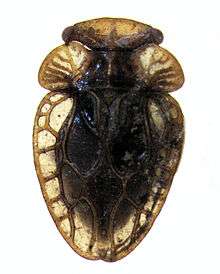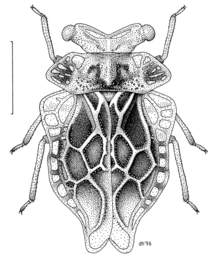Peloridiidae
The Peloridiidae or moss bugs are a family of true bugs, comprising eighteen genera and thirty-four species. They are small, ranging in length from 2 to 4 mm, rarely seen, peculiarly lumpy, flattened bugs found in Patagonia (Argentina and Chile), New Zealand, eastern Australia, Lord Howe Island, and New Caledonia. All the Peloridiidae species are flightless, except one (Peloridium hammoniorum).[1] Their present distribution suggests they have existed since before the breakup of Gondwana, and their relation to Heteroptera (true bugs) dates back to at least the upper Permian, more than 230 million years ago. Peloridiids are found amongst mosses and liverworts, commonly in association with southern beech forests. They have become known as moss bugs for their habit of feeding on mosses.
| Peloridiidae | |
|---|---|
 | |
| Xenophyes rhachilophus | |
| Scientific classification | |
| Kingdom: | Animalia |
| Phylum: | Arthropoda |
| Class: | Insecta |
| Order: | Hemiptera |
| Suborder: | Coleorrhyncha |
| Superfamily: | Peloridioidea |
| Family: | Peloridiidae Breddin, 1897 |
Evolution
Peloridiidae are the only extant[2] family in the suborder Coleorrhyncha. Historically the Peloridiidae and their fossil kin were assigned to a variety of orders. In 1929 Myers and China placed them in the Homoptera, in 1962 China placed them in the Auchenorrhyncha, and in 1963 Evans placed them in the Cicadomorpha. This was followed by Bourgoin in 1997 who placed the Peloridiidae in Fulgoromorpha. However, following Bekker-Migdisova's 1952 suggestion, and Popov and Wootton's 1977 review, there is consensus that the Peloridiidae belong in Coleorrhyncha and that Coleorrhyncha is a sister group to the Heteroptera. Schlee (1969), Wheeler et al. (1993), Schuh & Slater (1995), Campbell et al. (1995), Ouvrard et al. (2000) and Brozç (2007).
The question remains whether this affinity between the Coleorrhyncha and the Heteroptera necessitates the imposition of a suborder between them and the order Hemiptera. In 1995 Sorensen proposed the name Prosorrhyncha for such suborder. (See the Heteroptera and Prosorrhyncha pages for a discussion).
Genera

- Craspedophysa Burckhardt, 2009
- Hackeriella Evans, 1972
- Hemiodoecellus Evans, 1959
- Hemiodoecus China, 1924
- Hemiowoodwardia Evans, 1972
- Howeria Evans, 1959
- Idophysa Burckhardt, 2009
- Kuscheloides Evans, 1982
- Oiophysa Drake & Salmon, 1950
- Oiophysella Evans, 1982
- Pantinia China, 1962
- Peloridium Breddin, 1897
- Peloridora China, 1955
- Peltophysa Burckhardt, 2009
- Rhacophysa Burckhardt, 2009
- Xenophyes Bergroth, 1924
- Xenophysella Evans, 1982
Notes
- The South American Peloridiidae Peloridium hammoniorum Breddin, 1897 has both a winged and a wingless form. (Burckhardt, 2009)
- Other families in the Coleorrhyncha are preserved in the fossil record, notably the early Progonocimicidae, and the later Karabasiidae and Hoploridiidae. Heads, Sam W. (2008). "A new species of Yuripopovia (Coleorrhyncha: Progonocimicidae) from the Early Cretaceous of the Isle of Wight" (PDF). British Journal of Entomology and Natural History. 21: 247–253.
References
- Bergroth, Ernst Evald (1924). "A new genus of Peloridiidae from New Zealand". Entomologist's Monthly Magazine. 60: 178–181.
- Bourgoin, Thierry H., Steffen‐Campbell, J. D., & Campbell, B. C. (1997). "Molecular phylogeny of Fulgoromorpha (Insecta, Hemiptera, Archaeorrhyncha). The enigmatic Tettigometridae: evolutionary affiliations and historical biogeography". Cladistics. 13 (3): 207–224. doi:10.1111/j.1096-0031.1997.tb00316.x.CS1 maint: multiple names: authors list (link)
- Brozç, Jolanta (2007), Labial sensillae and the internal structure of the mouthparts of Xenophyes cascus (Bergroth 1924)(Peloridiidae: Coleorrhyncha: Hemiptera) and their significance in evolutionary studies on the Hemiptera (PDF)
- Burckhardt, Daniel (2009). "Taxonomy and phylogeny of the Gondwanan moss bugs or Peloridiidae (Hemiptera, Coleorrhyncha)". Deutsche Entomologische Zeitschrift. 56 (2): 173–235. doi:10.1002/mmnd.200900019.
- Burckhardt, Daniel (2010). "Mooswanzen–Peloridiidae (Hemiptera, Coleorrhyncha), eine enigmatische Insektengruppe" (PDF). Entomologica Austriaca (in German). 17: 9–22. Archived from the original (PDF) on 20 December 2013. Retrieved 20 December 2013.
- Campbell, Bruce C.; Steffen-Campbell, Jody D.; Sorensen, John T. & Gill, Raymond J. (1995). "Paraphyly of Homoptera and Auchenorrhyncha inferred from 18S rDNA nucleotide sequences". Systematic Entomology. 20 (3): 175―194. doi:10.1111/j.1365-3113.1995.tb00090.x.
- China, William Edward (1962). "South American Peloridiidae (Hemiptera–Homoptera: Coleorrhyncha)". Transactions of the Royal Entomological Society of London. 114 (5): 131–161. doi:10.1111/j.1365-2311.1962.tb01077.x.
- Evans, John William (1963). "The systematic position of the Ipsviciidae (Upper Triassic Hemiptera) and some new Upper Permian and Middle Triassic Hemiptera from Australia (Insecta)". Australian Journal of Entomology. 2 (1): 17–23. doi:10.1111/j.1440-6055.1963.tb00384.x.
- Evans, John William (1982). "A review of present knowledge of the family Peloridiidae and new genera and new species from New Zealand and New Caledonia (Hemiptera: Insecta)" (PDF). Records of the Australian Museum. 34 (5): 381–406. doi:10.3853/j.0067-1975.34.1982.296. Archived (PDF) from the original on 5 December 2011.
- Hoch, H.; Deckert, J.; Wessel, A. (2006). "Vibrational signalling in a Gondwanan relict insect (Hemiptera: Coleorrhyncha: Peloridiidae)". Biology Letters. 2 (2): 222–224. doi:10.1098/rsbl.2006.0451. PMC 1618915. PMID 17148367. Archived from the original on 2012-12-23.
- Larivière, Marie-Claude; Burckhardt, Daniel & Larochelle, André (2011). Peloridiidae (Insecta: Hemiptera: Coleorrhyncha). Fauna of New Zealand, No. 67 (in English and Maori). Lincoln, Canterbury, New Zealand: Manaaki Whenua Press, Landcare Research. ISBN 978-0-478-34730-2. Abstract
- Kuechler, Stefan Martin; et al. (2013). "Diversity of bacterial endosymbionts and bacteria–host co‐evolution in Gondwanan relict moss bugs (Hemiptera: Coleorrhyncha: Peloridiidae)". Environmental Microbiology. 15 (7): 2031–2042. doi:10.1111/1462-2920.12101. PMID 23452253.
- Myers, John Golding & China, William Edward (1929). "The systematic position of the Peloridiidae as elucidated by a further study of the external anatomy of Hemiodoecus leadi China". Annals and Magazine of Natural History. 105 (3): 282–294. doi:10.1080/00222932908672971.
- Ouvrard, David; Campbell, Bruce C.; Bourgoin, Thierry & Chan, Kathleen L. (2000). "18S rRNA Secondary Structure and Phylogenetic Position of Peloridiidae (Insecta, Hemiptera)". Molecular Phylogenetics and Evolution. 16 (3): 403–417. doi:10.1006/mpev.2000.0797. PMID 10991793.
- Popov, Yu A. & Wootton, Robin J. (1977). "The Upper Liassic Heteroptera of Mecklenburg and Saxony". Systematic Entomology. 2 (4): 333–351. doi:10.1111/j.1365-3113.1977.tb00382.x.
- Schlee, Dieter (1969). "Morphologie und Symbiose, ihre Beweiskraft für die Verwandtschaftsbeziehungen der Coleorrhyncha (Insecta, Hemiptera): phylogenetische Studien an Hemiptera IV: Heteropteroidea (Heteroptera+ Coleorrhyncha) als monophyletische Gruppe". Staatliches Museum für Naturkunde (in German). 210: 1–27.
- Schuh, Randall T. & Slater, James Alexander (1995). True bugs of the world (Hemiptera: Heteroptera): classification and natural history. Ithaca, New York: Cornell University Press. ISBN 978-0-8014-2066-5.
- Sorensen, John T., Campbell, Bruce C., Gill, Raymond J., and Steffen-Campbell, Jody D. (1995). "Non-monophyly of Auchenorrhyncha ("Homoptera"), based upon 18S rDNA phylogeny: eco-evolutionary and cladistic implications within pre-Heteropterodea Hemiptera (sl) and a proposal for new monophyletic suborders". The Pan-Pacific Entomologist. 71 (1): 31–60.CS1 maint: multiple names: authors list (link)
- Wheeler, Ward C.; Schuh, Randall T. & Bang, Ranhy (1993). "Cladistic relationships among higher groups of Heteroptera: congruence between morphological and molecular data sets". Insect Systematics & Evolution. 24 (2): 121–137. doi:10.1163/187631293X00235.
External links
| Wikispecies has information related to Peloridiidae |
- Images of Peloridium hammoniorum http://homepage.ruhr-uni-bochum.de/Andre.Mursch/14.htm